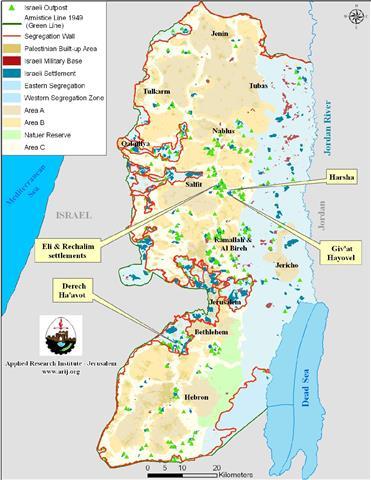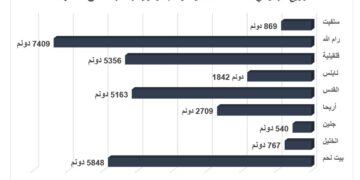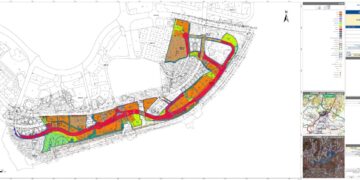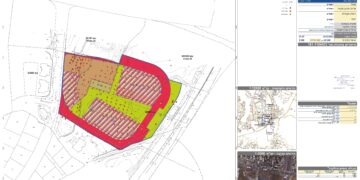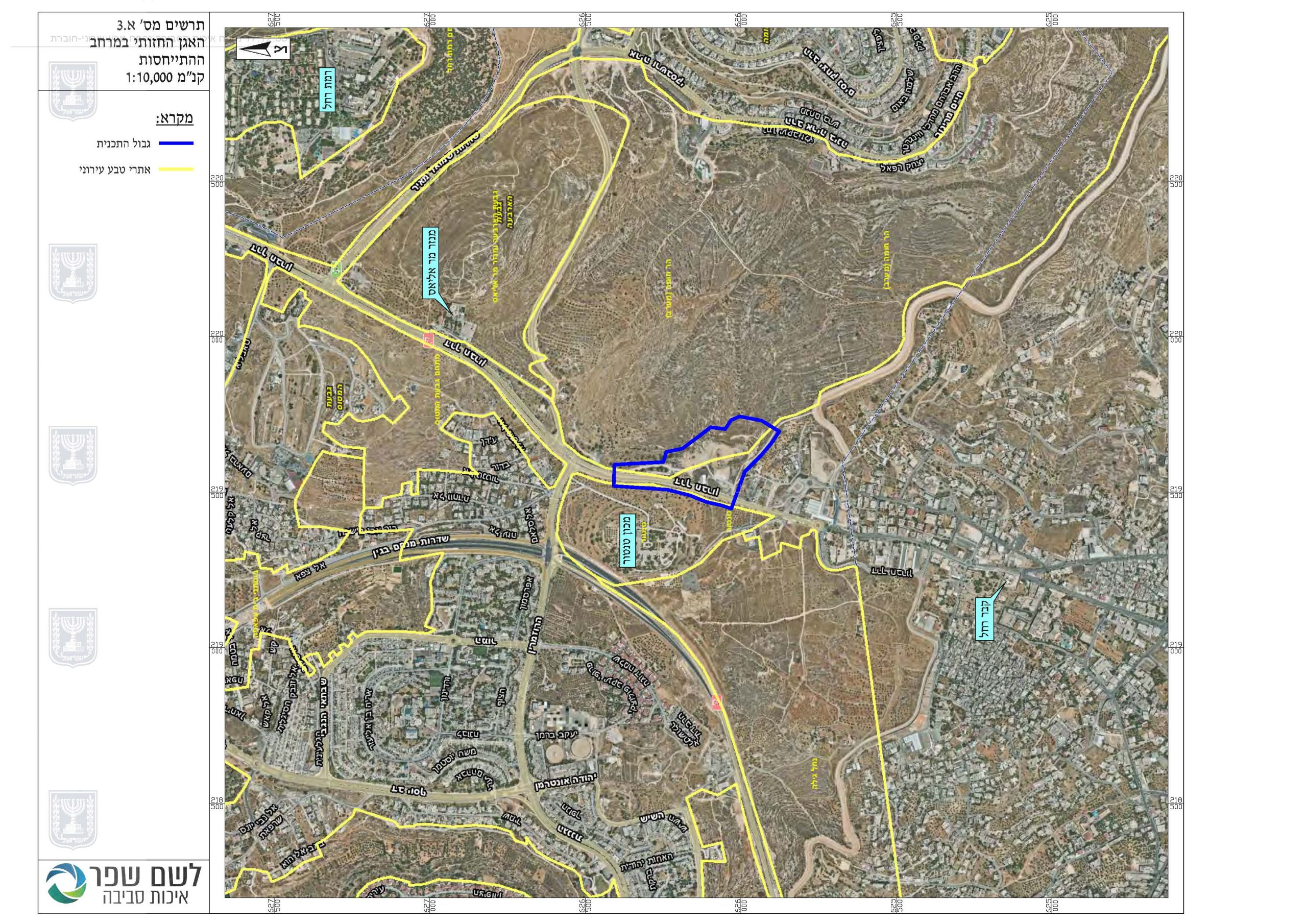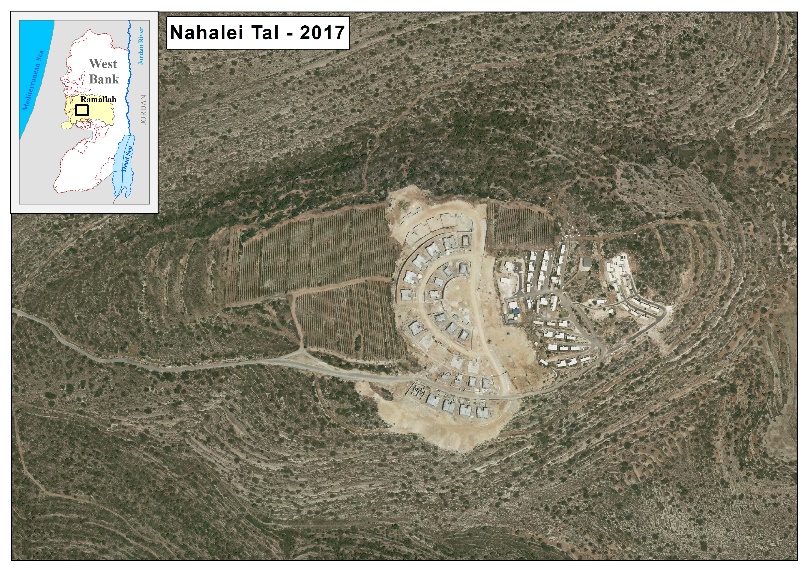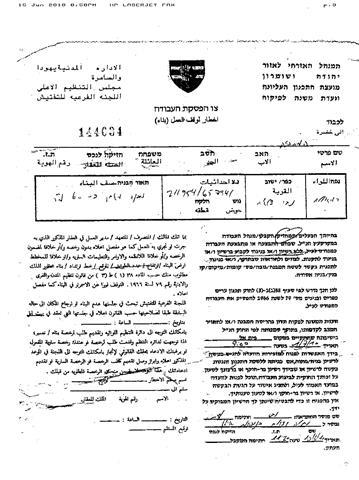In recent reports by leading Israeli news agencies
the Israeli state prosecutor, Moshe Lador, informed the Israeli High Court of Justice, on May 24, 2010, on the state’s intentions to retroactively authorize dozens of buildings in various illegal settlements’ outposts situated in occupied Palestinian territory, beyond the 1949 Armistice Line (Green Line). The state’s declaration came in response to appeals filed by Israeli settlers demanding that the Israeli Civil Administration [I.C.A.] retroactively’ legalize homes built without permits in Israeli settlements built in the oPt.
Accordingly, the Israeli settlers are pursuing their fight on the basis of the following claim: that the I.C.A has legalized 1,600 constructions built in Area ‘C’, therefore, Israeli settlements outposts should be legalized.
Israeli media reports that the state will retroactively authorize buildings in the following settlements’ outposts: Native Ha’avot, Givat Hayovel, Harsha and Rahelim. (Map 1)
Map 1: Location of Israeli outposts to be legalized
In previous detailed reports, the Israeli state prosecutor has declared the state’s intentions towards legalizing the outposts based on land survey
]. The state claims that outposts are built on state owned land, and by such claim outposts could be legalized. Such claims are found irrelevant and unlawful in the occupied territory under International Law.
One may argue that an occupying power’s claim is based on equal treatment of all citizens living under its jurisdiction. Before crediting these false assumptions one should take the following facts into consideration:
1- Depending on one’s personal political affiliations, views, and perspectives when approaching the Israeli Palestinian conflict, the word ‘Palestine’ has acquired various meanings. In a geopolitical frame, the word ‘Palestine’ generally refers to the political unit designated by the British Mandate that took possession of the region from the vanquished Ottoman Empire in the World War I, a 27,090 km² area lying between the river Jordan and the Mediterranean Sea. However, after the 1948 war, Israeli forces took control of 20,700 km² and established the State of Israel on that area.
2- In 1967, Israel occupied the remains of the 27,090 km², the West Bank including East Jerusalem and the Gaza Strip, plus the Golan Heights and the Sinai Peninsula. All combined were never recognized by international law as part of the state of Israel.
3- United Nations General Assembly adopted resolution A/RES/64/19 clearly noted and re-affirmed the illegality of all Israeli occupation practices of exploitation and control over the occupied Palestinian territory, including the illegality of Israeli settlements built within the 1967 occupied Palestinian territory including East Jerusalem, and re-affirmed the international legal stance towards the ‘Palestinian territories’ as occupied territories.
4- The previously mentioned General Assembly resolution also re-affirmed relevant resolutions previously set by the UN General Assembly, and UN Security council; ‘Recalling further relevant Security Council resolutions, including resolutions 242 (1967) of 22 November 1967, 338 (1973) of 22 October 1973, 1397 (2002) of 12 March 2002, 1515 (2003) of 19 November
2003, 1544 (2004) of 19 May 2004 and 1850 (2008) of 16 December 2008′
Consequently, the Israel Basic Law ‘Jerusalem Capital of Israel’, which was passed by the Israeli Knesset on July 30, 1980, declared the annexation of territories East to the 1949 Armistice Line (Green Line) which redefined the Jerusalem boundaries. This is not only considered a breach to international law, but has also faced international protest, including UN Security Council Resolution 478 which declared the new Basic Law ‘null and void’.
The previously mentioned UN General Assembly resolutions and UN Security Council resolution [UN SC resolution 237, 271, 446, 452, 465, 476, 478, 592, 605, 607, 636, 672, 694, 726, 799, 904, 1073, 1322] , firmly called upon Israel as an occupying power to comply with international law and end all practices contrary to international law affirming the applicability of international laws at ‘Time of War’ concerning the Israeli Palestinian conflict; thereby, the Forth Geneva Convention is an applicable binding treaty which firmly obliges the occupying power under its articles to avoid such appropriation of property, ‘The occupying power shall not deport or transfer parts of its own population into the territories it occupies'(Article 49).
Furthermore and under Article 147 of the same convention, ‘extensive destruction and appropriate of property, not justified by military necessity and carried out unlawfully and wantonly is a grave breach of the Convention and thus constitutes a war crime’.
Therefore, the status of the Israeli settlement enterprise is approached as an illegal practice of an occupying power and holds Israel as an occupying power responsible for the occupied native Palestinian population and accountable towards the world nations. Such acts are categorized as ‘Grave Breach’ to the international laws constituting war crime.
‘Without prejudice to the provisions of the foregoing Article, grave breaches of the Convention shall be punished as crimes against the law of nations by the tribunals of any of the High Contracting Parties or by any international jurisdiction the competence of which has been recognized by them. Grave breaches shall include in particular those which cause death, great human suffering or serious injury to body or health, those which constitute a grave denial of personal liberty or a derogation from the dignity due to the person or involve extensive destruction of property, also breaches which by reason of their nature or persistence show a deliberate disregard of this Convention’.
With the advent of the Oslo agreements, a new term was added to the conflict’s dictionary: ‘Palestinian Territories’. In sum ‘Mandate Palestine’ refers to the 27,090 km2 area, the ‘Palestinian State’ refers to the West Bank and Gaza areas as they were before the 1967 war. The ‘Palestinian Territories’ refer to those areas over which the Palestinian National Authority exercises some level of self-rule as they await final status agreement on the issues of boarders, Jerusalem, refugees, settlements and water.
[The In December 1987, the first Palestinian Intifada broke out carrying the message of rejecting the Israeli Occupation, at the same time called for a resolution to the Israeli – Palestinian conflict. In 1988, the Palestinian National Assembly adopted the two-state solution as a resolution to the Palestinian-Israeli conflict and to establish the State of Palestine in the West Bank and Gaza Strip (the two areas occupied by Israel after the 1967 war). Palestinians accepted the discourse of peaceful negotiations which was based on the grounds outlined in the Madrid Conference of 1991
The principle guideline of these negotiations was based on the concept ‘Land for Peace’, based on United Nations Security Resolutions 242 and 338. Hence ‘Palestine’ started to refer to the West Bank and Gaza.
After several rounds of talks in Washington D.C, the PLO and Israel were able to come out with the Declaration of Principles (DOP) agreement, which was signed in September 1993. The DOP called for an interim period of 5 years during which the representatives of the Palestinian people and the Israeli government will initiate negotiations over the final status, which include Jerusalem, refugees, settlements, borders and water. The two parties also agreed that ‘neither party should initiate any action during the interim period that might jeopardize the outcome of final status negotiations’.
The Oslo II agreement, signed in Washington D.C. in September of 1995, sets out the interim stage for Palestinian Autonomy in the West Bank and Gaza, pending ‘final status negotiations’, which were scheduled to last from May 1996 until May 1999. The Interim Agreement states that the first phase of the Israeli military forces redeployment will be completed prior to the eve of the Palestinian elections.
The further redeployments were to be completed within 18 months from the date of the inauguration of the Council. During this time, the powers and responsibilities relating to territory will be transferred gradually to Palestinian jurisdiction to cover West Bank and Gaza Strip territory, except for the issues that will be negotiated in the permanent status negotiations (i.e. Jerusalem and the Settlements).
This meant that 95 % of the West Bank and Gaza should have become under Palestinian control 18 months after the inauguration of the Council. However, on the ground, this did not happen. Stalling of negotiations and delays as well as renegotiation of what was already agreed upon led to partial Israeli withdrawals. So, by March 2000 the areas under effective Palestinian control amounted to no more than 18.3 %, which constitutes areas ‘A’, while 17.7% of the remaining area is area ‘B’, and 61% area ‘C’.
‘Article XXXI, Oslo II, 1995 provides: Neither side [Palestinians and Israel], shall take any step that will change the status of the West Bank and the Gaza Strip’.]
International Law and Human Rights Conventions have tackled the issue of land property and illegal confiscation. The Forth Geneva Convention and under articles 49 and 147 prohibited the confiscation and the appropriation of native population property. Such unlawful behavior consists a ‘Grave Breach’ of international laws, as it deprives the native civil population their rights of property, and the utilization of private property for self sustainably (i.e. housing, utilization of resources and immovable property).
The Hague Regulations also require that the Occupying Power administer public lands, but only under the rules of usufruct; therefore the title of the public land is not transferred to the Occupying Power. The Occupying Power only acquires control over the “fruits” of the land, and may engage in profitable use of public lands only for the benefit of the local population, as well as to cover the cost of the occupation itself (Article 55 of the Hague Regulations, see also Article 48 and Article 49 of the Hague Regulations).
The Occupying Power may not destroy public or private property unless such actions are rendered absolutely necessary by military necessity (Article 53 of the Fourth Geneva Convention). Furthermore, an Occupying Power cannot requisite or seize private property on grounds other than security, unless such action is undertaken in accordance with local legislation in the occupied territory, i.e.
legislation that predates the occupying force assuming control (Article 43 and Article 46 of the Hague Regulations).
International Committee of the Red Cross (ICRC) has issued an explanatory interpretation note
on the matter of occupation and its space of permitted practices and exploitation of occupied territories at times of war. Listed below are key note interpretations that should be addressed when approaching the matter of the illegal Israeli exploitation of the Palestinian occupied territories.
• ‘The duties of the occupying power are spelled out primarily in the 1907 Hague Regulations (arts 42-56) and the Fourth Geneva Convention (GC IV, art. 27-34 and 47-78), as well as in certain provisions of Additional Protocol I and Customary international humanitarian law.
• Agreements concluded between the occupying power and the local authorities cannot deprive the population of occupied territory of the protection afforded by international humanitarian law (GC IV, art. 47) and protected persons themselves can in no circumstances renounce their rights (GC IV, art. 8).
• The main rules of the law applicable in case of occupation state that:
1. The occupant does not acquire sovereignty over the territory.
2. Occupation is only a temporary situation, and the rights of the occupant are limited to the extent of that period.
3. The occupying power must respect the laws in force in the occupied territory, unless they constitute a threat to its security or an obstacle to the application of the international law of occupation.
4. To the fullest extent of the means available to it, the occupying power must ensure sufficient hygiene and public health standards, as well as the provision of food and medical care to the population under occupation.
5. Collective or individual forcible transfers of population from and within the occupied territory are prohibited.
6. Transfers of the civilian population of the occupying power into the occupied territory, regardless whether forcible or voluntary, are prohibited.
7. The confiscation of private property by the occupant is prohibited.
8. The destruction or seizure of enemy property is prohibited, unless absolutely required by military necessity during the conduct of hostilities.’
Moreover, the previously mentioned notes interpret the allowed and contained rights of the occupied regarding natural resources, private property and public property that is found within the occupied territories, the following should also be noted in regards to private and public property:
Private property:
Private property cannot be confiscated by the occupier.
Food and medical supplies may be requisitioned exclusively for the use of the occupation forces and administration personnel themselves (i.e. not for purposes of export outside of the occupied territory and not for the benefit of anyone beyond the occupying personnel, unless necessary for the benefit of the population under occupation itself) and only if the needs of the civilian population have been taken into account (GC IV, art. 55).
Public property:
The occupying power may seize any movable property, belonging to the state, which may be used for military operations (HR, art. 53).
The occupant does not acquire ownership of immovable public property in the occupied territory, since it is only a temporary administrator. Subject to restrictions regarding their exploitation and use, it can nevertheless make use of public property, including natural resources, but it must safeguard their capital value, in accordance with the law of usufruct (H R, art. 55).
As an internationally recognized occupying power, Israel is prohibited from taking any action that would result in the transfer of part of its population to the occupied territory, including taking any measures aimed at facilitating in whatever way the migration of its nationals toward the occupied territory. In particular, it cannot confiscate land in the occupied territory for the sole purpose of establishing settlements for its nationals.
Israel is obliged to preserve and maintain the demographic and social configuration of the occupied territory, which may entail restricting even voluntary migrations if such migrations threaten to upset the demographic and social configuration of the occupied territory.
Israeli government has also been found involved in facilitating [promoting and financing] the settlement movement.
For instance, many of the settlements in the West Bank (as well as disadvantaged communities within Israel) are defined as ‘national priority areas,’ which results in increased government funding compared to other communities, including housing subsidies.
The Israeli Ministry of Housing was reported at one period to be devoting 20% of its budget to housing for settlers.
There are also various tax incentives and discounts available to individuals living in the settlements, as well as to businesses located there.
Further, the Israeli government pays significantly more per capita to local government councils in Israeli settlements than it does to local government councils for municipalities in Israel itself.
According to a recent news report, the Israeli government spends over NIS 10,000 more per capita on settlers than on citizens living with Israel.
This governmental support serves to undermine the Israeli argument that “the movement of individuals to the territory is entirely voluntary.”
Furthermore the Article 17 of the Universal Declaration of Human Rights (adopted and proclaimed by the General Assembly of the United Nations on December 10 1948) clearly states right of personal property should be safeguarded by the UN:
Article 17. of the Universal Declaration of Human Rights
•?Everyone has the right to own property alone as well as in association with others.
•?No one shall be arbitrarily deprived of his property
In conclusion, the Israeli state prosecutor argument of approaching a status of legalizing the settlements in the occupied territory is based on the false claims of state owned lands, and contradicts with the spirit of international law and international legitimacy, and undermines the responsibilities that Israel as an occupying state holds towards the native population.
The mere existence of the settlements is contradictory to international legitimacy mentioned, and for that Israel should be deploring alternatives for conflict resolution instead of means to alter the status of its violation policies in the occupied Palestinian territories.
:::::::::::___
3-Madrid Conference of 1991: It was hosted by the government of Spain and co-sponsored by the USA and the USSR. It convened on October 30, 1991 and lasted for three days. It was an early attempt by the international community to start a
peace process through negotiations involving Israel and the Palestinians as well as Arab countries including Syria, Lebanon, and Jordan through negotiations involving and the as well as Arab countries including , , and
4- Occupation and international humanitarian law: questions and answers.
A series of questions and answers by the ICRC’s legal team on what defines occupation, the laws that apply, how people are protected, and the ICRC’s role.
http://www.icrc.org/web/eng/siteeng0.nsf/html/634KFC
6- BENVENISTI, supra note 12, 140 (1993).
8- “Jewish settlers get big part of Israeli housing budget”, Agence France Presse, Aug. 4, 1997
10-Id. p. 63. According to the Report, “The level of general grants provided by the government for local councils in the West Bank in 2000 averaged NIS 2,224 per resident, compared with an average of NIS 1,336 per resident for local councils in Israel – i.e. sixty five percent more.”
11-HA’ARETZ, “The Price of Settlements,” Friday, Sept. 26, 2003
14-Resolution adopted by the General Assembly [without reference to a Main Committee (A/64/L.23 and Add.1)] 64/19. Peaceful settlement of the question of Palestine


